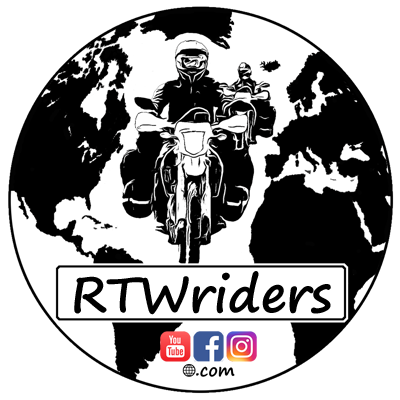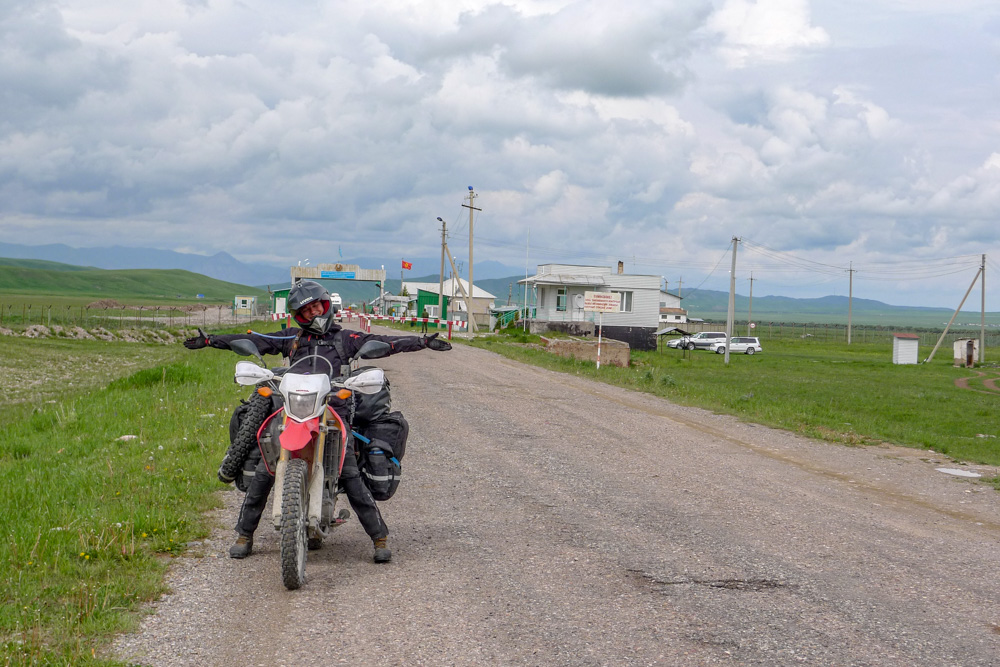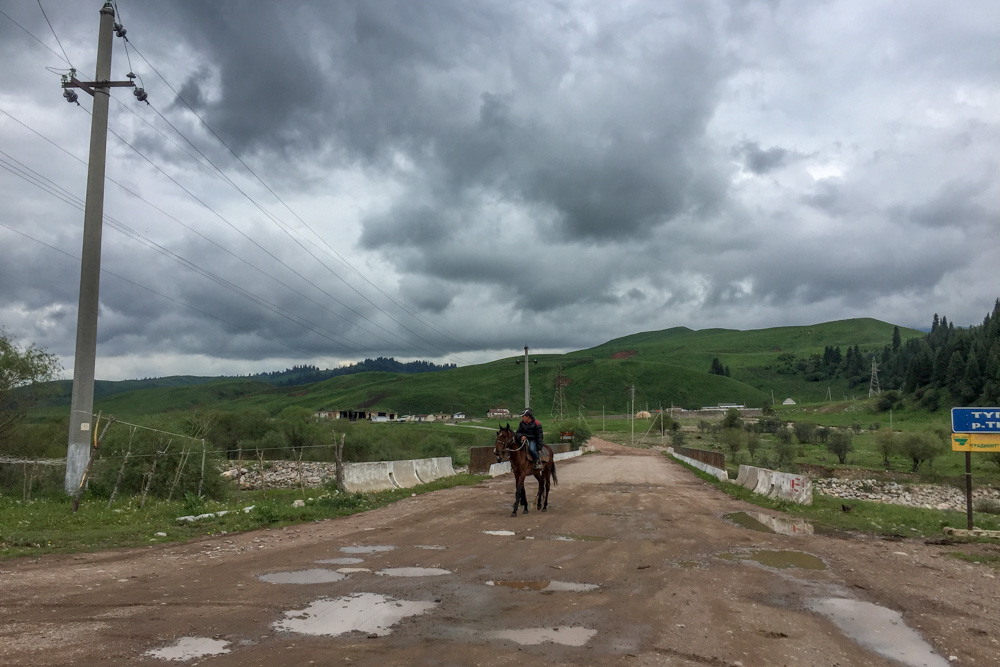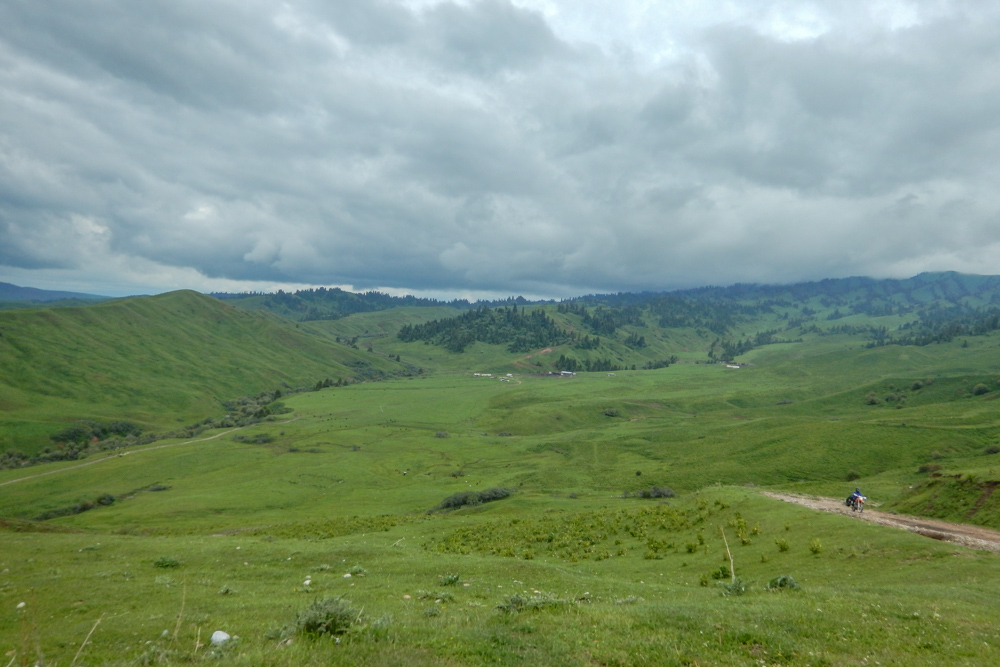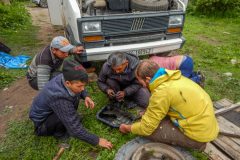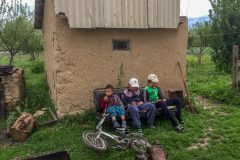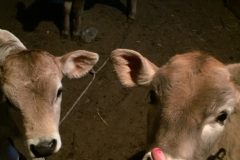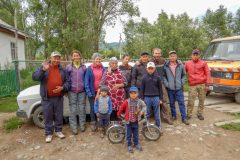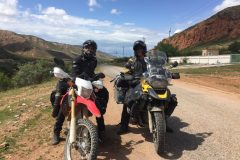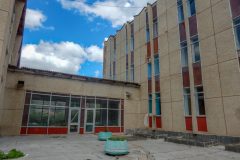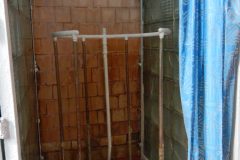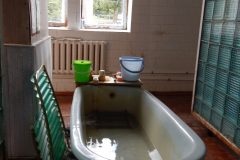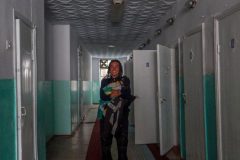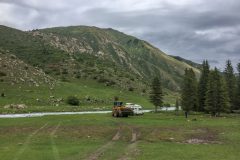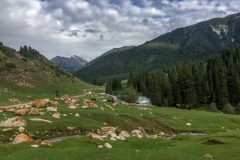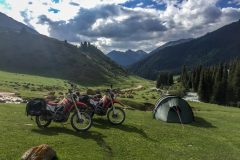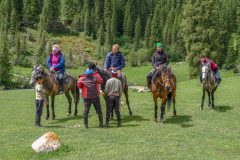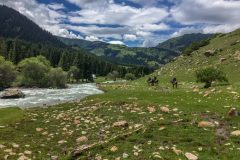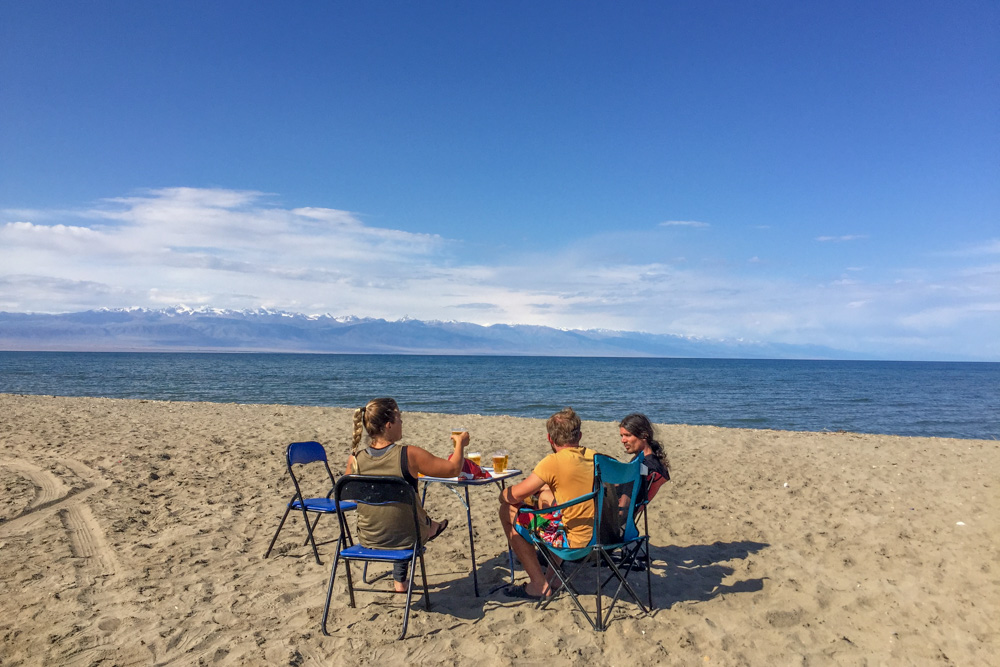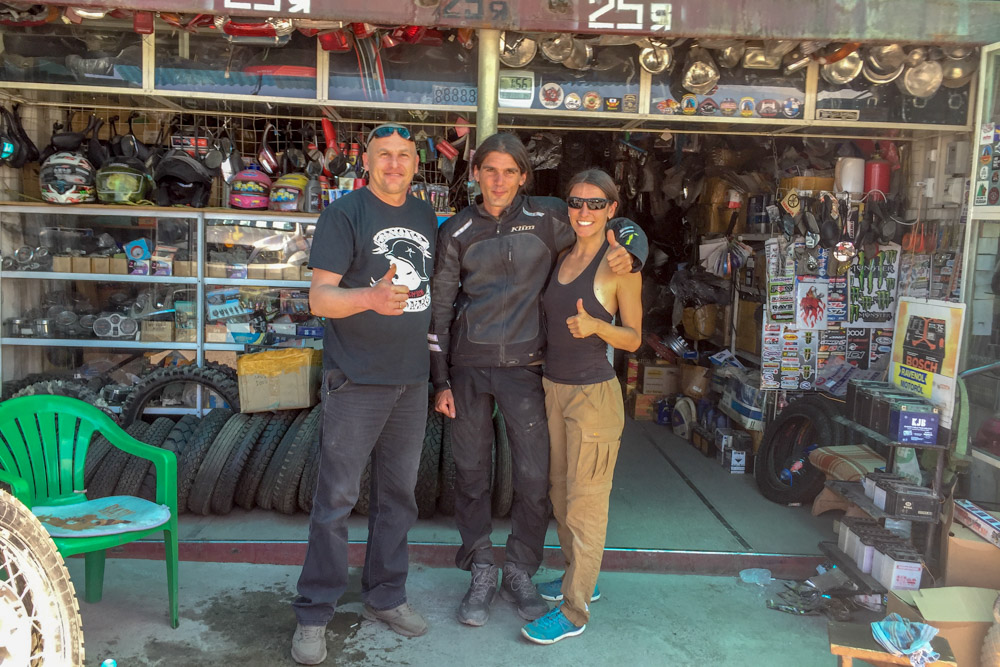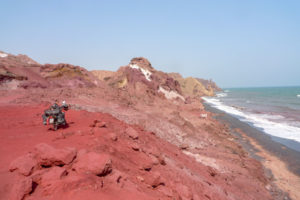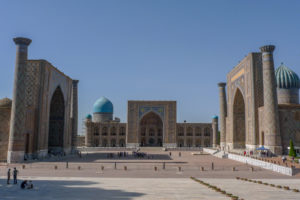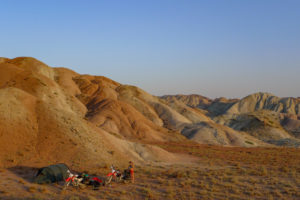A young border official greets us on the Kazakh side and wants to know where we are from, of course. It doesn’t seem like lots of tourists pass this border and there aren’t many local vehicles either. So we are the only ones who want to enter Kyrgyzstan at this time. It is no wonder that the border guards seem to be bored and they have enough time to chat with us and take a close look at everything. That does not mean, that they check our luggage in detail. It is more like they have a pleasant small talk, while casually looking in our opened luggage and observing our reactions. It quickly becomes much more important how far we had been riding so far, how much horsepower our motorcycles have, whether we liked Kazakhstan…
We are greeted in a similar polite manner on the Kyrgyz side. For the custom officer it seems important to mention, that Kyrgyzstan is even more beautiful than Kazakhstan though. With a friendly “Welcome to Kyrgyzstan” we are finally allowed to continue.
The landscape is hilly and lush green everywhere. The rivers look like they have been cut into the meadows. They have no real bank, but go straight into the grass. There are no fences here and all cows, horses, sheep and goats are allowed to roam around freely. An absolute paradise not only for the animals.
The gravel road finally leads us to a crossroads after a few kilometers. On the right side, it is a tarred road, but “Offroad”-Andi (the swiss guy) chooses the left one and after a few meters we face a steep slope with huge pebbles everywhere. The poor campervan is tormented once again. We continue for many kilometers on extremely bad roads until we can already see a village in the distance. On the way down to the village, we suddenly hear a loud bang. Andreas stops immediately and turns off the engine. A large pebble has completely dented the camper’s oil pan. We try to start the engine again briefly, but it immediately shows the oil indicator light. Therefore we push poor “Klumpi” the remaining meters to the village.
As soon as we reach the first houses, a friendly-looking man and his kids come up to us. Once again, Andreas’ Russian skills are worth their weight in gold. Nurlan is willing to help us and we push the camper into his courtyard. Behind the house are fields and a barn with cows and chickens. Two temporary wooden ramps are used to jack up the front of the motor home. When the oil pan is finally dismantled, we can see, that the intake of the oil pump has been torn off. It must be welded the next day, but that is only possible in the next larger town called Karakol. Therefore we are first supplied with lots of goodies in their own dining room, before the oil pan gets bulged again with a chisel and a sledgehammer. We are also allowed to stay in the neighbouring house for the night. There is a room with some blankets, where all four of us find a place to sleep.
After breakfast the next day we get up early, because the girls want to watch the milking. Every morning the cows are milked and then chased onto the village street, where a cowboy collects all the village cows and guides them to the pastures. That also makes sense, since each family here only has a handful of cows. Miri plays with the baby cows and gets her index finger bitten – baby cows have dangerous fangs and go crazy with blood!
In the meanwhile Andreas and Nurlan make their way to see the welder in Karakol. The rest of us actually eat most of the time while waiting for positive news. Around noon, Andreas and Nurlan come back successfully. They also brought along the welder himself. Pretty much the whole village has gathered in Nurlan’s garden and is watching the repair work – finally something was going on here! After the oil pan and the oil pump have been reassembled, everything works again, but it is still leaking. So the whole thing is dismantled again and the oil pan gets welded, too. In the afternoon the camper is ready to go again and we can continue our journey.
We actually want to go to another hot spring near Ak-Suu. Unfortunately the road consists only of mud with boulders and we don’t want to risk that with the newly repaired Klumpi. Therefore we set up our camp for the night on a small meadow at the entrance of the valley. The next day, Robin (the British biker, we had already met in Almaty) comes riding out of the valley. He tried to ride the bumpy track, but dropped his big BMW and finally had to turn around. He spent a few days below his tarp with wine and vodka and waited for better weather. Since he seems to be a “certified” beer drinker, too – he gets integrated into our group.
We head on to a region called the Valley of Flowers. There also should be a hot spring somewhere and we all agree, that it would be time for another shower. However the only “spring” we can find is somewhat like a health spa. The building has seen better days, has the typical Soviet flair and is reminiscent of a mental health clinic from a horror movie, where scantily clad girls get chopped in pieces by a maniac.
Actually it is already closed, but the “Soviet”-Spa-woman makes a grumpy exception, if we promise to hurry up. So we rush through the dark corridors, which are all still equipped with ancient carpets. She commands us to wait to prepare our bathes. In the meanwhile we have a look in the neighbouring room, that is full with “torture” equipment. While we are still considering, how it is used, we get harshly told, that we were not allowed to enter this room.
We have to separate and get locked into individual cubicles (like slaughter cattle) and have to sit naked in rusty “tetanus” bath tubs. In the back of the room the cabins are connected to each other, the view of the neighbouring bath tubs is blocked by corrugated fiberglass sheets. The strict “Soviet-Spa” woman patrols to make sure, that everyone has taken a seat. Then she turns on the mineral water – wtf, it’s cold! Our hearts almost stop to beat. Seeking help, Miri tries to lean over to Andrea. She also has cold water and both have to laugh until “Lady-Soviet” admonishes them to calm down. So they slide back into the cold water. “Only ten more minutes and we will get a hot shower to warm up!”. Well – we were wrong. No shower is allowed afterwards anymore, since it was healing water! We have to get dressed again and sprint through the corridors to the exit instead, where we get kicked out – what a movie…
At least we don’t stink anymore, so we continue our journey deeper into the valley. After a while we reach green, lush meadows, where happy horses, cows and sheep frolic. There are some yurts (also as accommodation for tourists) so we want to drive a little further up the pass road, but Klumpi is repeatedly stuck in mud. So we settle between the local yurts and sip our beer.
The next morning two boys on horses come by and ask, if we want to rent their horses. Three of us are interested, but only if we get accompanied – it was extraordinary for them, that people are not able to ride properly. Miri doesn’t have much experience in horseback riding, so she asks for a fat, slow, rather disabled horse. She ends up with a good-natured horse. Unfortunately the steering doesn’t work properly and there is always a tendency to walk right on the edge of a precipice or on mini trails with steep slopes. Since she doesn’t seem to have any power of decision anyway, she just lets it go. Miri’s mulish horse almost tumbles down a slope several times because of that. Tobi and Robin didn’t want to ride and just went for a hike.
The next morning we leave Robin behind, he wants to stay another day, and chug towards Lake Issyk-Kul. We set up camp right on the beach. Locals bathe and there were even changing rooms. “Were” – because in the night a big truck with a handful of people swipe the whole thing in front of our eyes. Tobi was still wondering, that they carry out repairs in the middle of the night, but we didn’t think about that anything further while drinking beer. The Issyk-Kul lake is huge and full of salt water. We realised that, since our coffee the first morning was inedible salty.
After two nights we continue to Bishkek. Although it is the capital of Kyrgyzstan, there is nothing special to see. Our highlight was the motor vehicle spare parts market, where we tried to find a replacement chain for Miriam’s motorcycle. It is a collection of containers, where you can find all imaginable spare parts for cars, trucks, tractors etc. We try our luck with Dima, a Russian with various motorcycle spare parts. Unfortunately we have no luck with the chain, but it was a very cool place anyway.
Since we absolutely need a replacement chain before Tajikistan, we decide to go back to Almaty the next day. This seems to be the only city in this area, with passable motorcycle spare parts supply.
